Two months.
Two Prime Ministers.
One Head of State.
Zero opportunity to vote for any of them!
There’s something seriously, seriously wrong with the state of our democracy.
Only one solution:


Bhutan, Brunei, Cambodia, Eswatini, Lesotho, Thailand, Tonga, United Kingdom. What do these countries have in common? (How many could you even locate on a globe?)
Well, the common link is not location: four of the non-UK countries are in Asia, two in Africa and one is an island in the Pacific. So, they are quite widely scattered around the world in no obvious pattern.
The only country of comparable size to the UK is Thailand with nearly 70 million people. Next comes Cambodia with nearly 17 million. The rest account for only four and a half million between them, with Lesotho accounting for about half of that figure.
Diversity rules here also. Three countries are majority Buddhist, three majority Christian and one Sunni Muslim. So, religion is not the common link.
Of the world’s 194 countries, the UK is in 26th position in terms of GDP per head of population (PPP rating). Only Brunei’s people are wealthier (9th). All the rest are much poorer, ranging from Thailand in 74th position to Lesotho at 166th.
I’m covering just one such right: the legality of male homosexual acts. In Brunei, such acts are, at least in theory, punishable by death. It’s still illegal, but the law is not enforced, In Eswatini and Tonga and it’s legal in the remaining five countries.
Brunei and Eswatini are absolute monarchies, with Brunei described as “autocratic”. The rest are classified as constitutional monarchies, but with some caveats. Cambodia is de facto a one-party state and Thailand see-saws between “genuine” democracy and military dictatorship: the Thais have the fourth highest rate of military coups in the world. And of course, the Tories have been in power for about two thirds of the time since full adult franchise, despite rarely achieving more than 50% popular support – and never since World War Two.
But we may be on to some connection here: all the countries in the list are monarchies. Getting close, but that’s not the connection. For example, there are still 12 monarchies in Europe, but only the UK is in my list.
The title of this blog post already contains the clue: these are the remining eight countries in the world who still hold coronation ceremonies for their new monarchs. Bhutan goes one step further and has an annual ceremony on the anniversary of the king’s coronation in 2006.
The last coronation in Britain for the previous monarch cost £46 million in 2022 prices. We have been promised a “stripped down” version this time, in a bow to the straitened times we’re living through. But is it really the best way to spend that sort of sum of money when millions are worried about affording to eat or heat this winter? The last coronation elsewhere in Europe took place over 100 years ago. What is it that makes us so backward?
Support for Britain becoming a republic varies over time, in part driven by events involving the royal family. But the latest polls suggest around one third of us want the country to be a republic. Amongst the young, the figures are reversed: amongst 18-24 year olds, support for the monarchy is only 31%. Following the accession without a vote last month, it really seems to be holding two fingers up to that significant minority – majority in the young – to continue, uniquely in Europe, this ludicrous, feudal ceremony. In the name of all that is sane and rational, is holding a coronation the sort of thing a member of the G7 countries should be doing in the 21st century?
Tanked
Not content with nearly tanking the economy with their mini-budget, the Truss government has another little problem with tanks, or rather the lack of them. I’m talking about gas tanks.

Half a century ago, when Tory Edward Heath was Prime Minister, the country was in turmoil with strikes and protests. One such strike was by the coal miners, at a time when (UK-mined) coal was by far the largest source of energy for electricity generation. People of my age remember the 3-day week accompanied by rolling 3-hour power cuts. The underlying problem was that electricity generators had run down their stockpiles of coal and so put themselves (and the country) in a vulnerable position when the miners went on strike.
Heath called a “who runs Britain?”-themed general election. The voters’ reply was “not you” and Harold Wilson (Labour) became Prime Minister in a hung parliament. Wilson subsequently awarded the miners a 35% pay rise.
You may be thinking: nothing like this could happen now?
Well, obviously no-one (except possibly bankers) would get a 35% pay rise and the top 1% of earners would never settle for so little. But there are some similarities…
Reports in the last 24 hours warn that, in a realistic worst case scenario, rolling 3-hour power cuts may be returning to Britain this winter. So what has changed in the past 50 years?
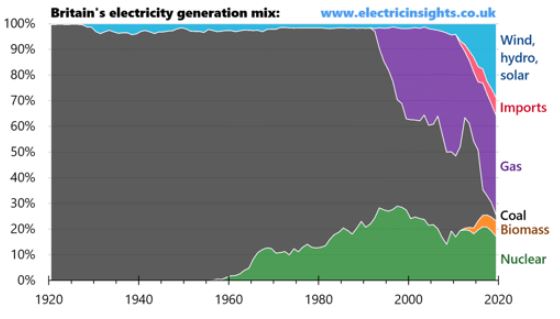
This graph (which covers the last 100 years) shows that, in the 1920s, all our electricity was generated by coal. At the time of the 3-day week, nuclear and a small amount of hydro power had made some incursions, together representing about 10-12% of electricity generated. So the miners still held enormous power over our electricity needs.
The really big changes have occurred in the last 30 years. In the 1990s, gas started to make big inroads into the dependence on coal (the latter by now all imported) and nuclear rose steadily over the 40 years from 1960. The past 10 years has seen a dramatic rise in renewables (wind and solar) and coal has now all but disappeared from the mix. Renewables now account for around 30% of electricity generated, the big rise being mainly in offshore wind. The much cheaper onshore wind saw its rise dramatically halted in 2015 by Tory changes to planning rules and NIMBY local authorities. It’s interesting to note that direct electricity imports (by cable), although still small, only feature in the mix from around 12 years ago. (Biomass remains controversial, with sharply differing opinions as to whether or not it can be considered “green”. I think not.)
Our current mix of electricity generation looks like this (figures for August 2022):
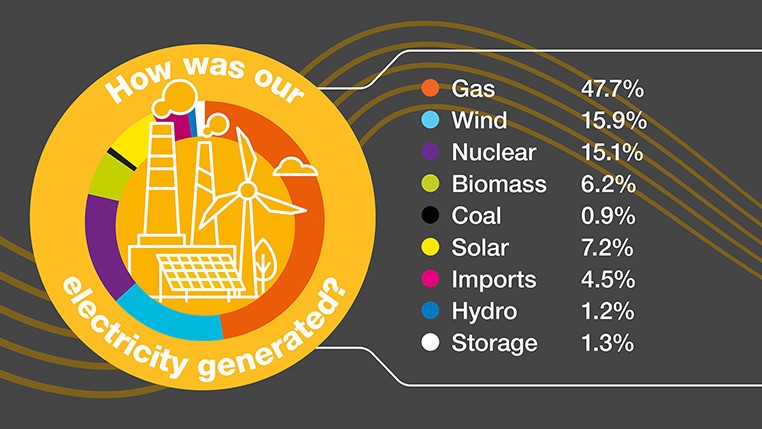
Gas still dominates: nearly half our electricity comes from gas, which is why it features strongly in the energy price. Coal has all but disappeared, but may make an unwelcome comeback to get us through the winter. “True” renewables (wind, solar, hydro) make up about a quarter, nuclear around 15% – and note that imports account for about 5%.
The government is correct to identify the Russian withdrawal of gas from world markets as the biggest disruptive effect to global gas supply. We import around 60% of our gas consumption (as both a fuel and for electricity generation) and export around 20%.
But there are 3 areas in which the UK has shot itself in the foot:
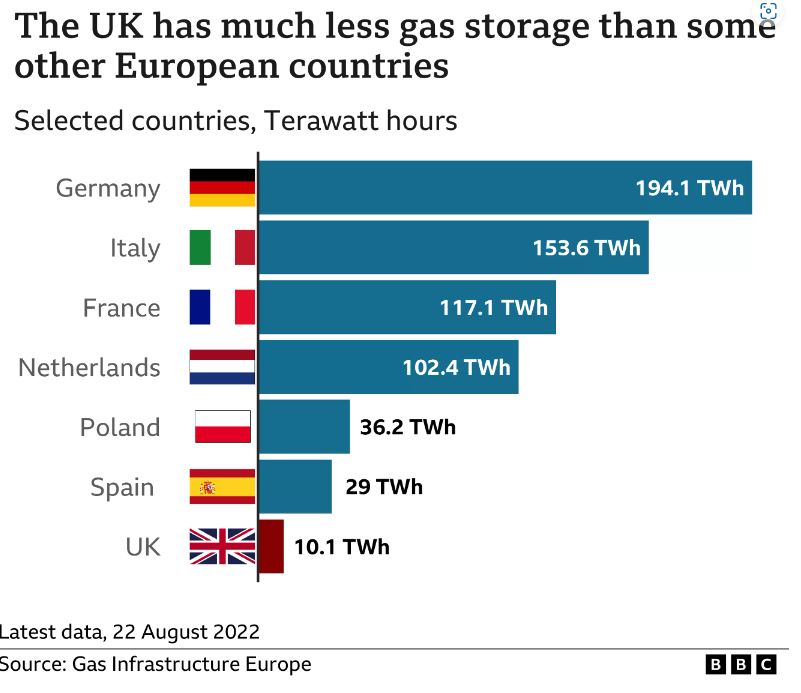
EU countries with ample gas storage facilities have been filling these over the summer months to provide a buffer stock for the winter. Currently, gas stored across the EU is at 90.4% of capacity, representing just over 3 months’ demand. By contrast, the UK’s tiny storage facility is 99% full, representing just four and a half days’ demand.
Go figure. And they say history does not repeat itself.
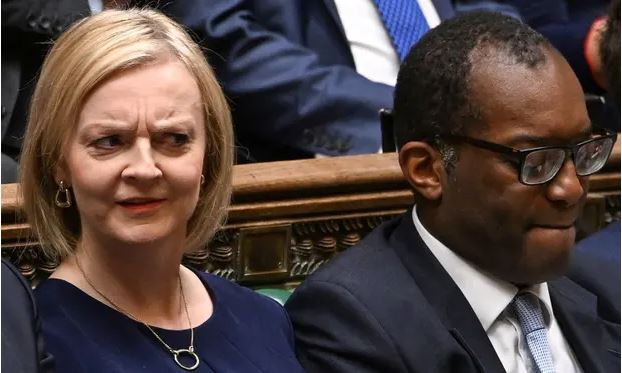
Have you noticed that Truss and her Cabinet colleagues have a new favourite phrase? It goes: “I do not accept the premise of your question.” They use it as a rhetorical ruse when they do not wish to answer a question.
So let’s talk about premises: specifically false premises.
A full 14 years after it imploded spectacularly in 2008, it seems the “old-time religion”, free market fundamentalism, is back in vogue. One of its key ideas is that of “trickle-down” economics, which is dependent on the two false premises of FMF. It is surely tragic that we have allowed our government to regress to such crazy ideas.
At risk of the old adage “I told you so”, I demonstrated, with evidence, in a post seven years ago: Inequality Damages Your Wealth, that so-called trickle-down economics is a myth. There’s a considerable amount of evidence to show that policies now advanced by the Truss government will not increase growth – quite the opposite.
Also from 2015, in a post entitled Two Castles (part 2), I spelled out the false premises upon which Truss’s economic philosophy depends. Truss’s assertions about growth depend on these implicit and false assumptions:
It seems unbelievable that the mistakes of the Thatcher / Reagan era are to be repeated. Unbelievable, but perhaps not unexpected, given that Truss and Kwarteng were two of the co-authors of the notorious book Britannia Unchained, with its assertion about Britain’s “laziest” workers. The book makes clear its authors’ admiration for Thatcher and for those who influenced her thinking: Friedrich Hayek and the novelist Ayn Rand.
So here we are. How long do we have to put up with this return to a failed ideology? (Here’s a view from across the pond.) Perhaps not long, given Truss’s unpopularity in the opinion polls: Tory MPs appear to be spooked by this. Only a week and a half after “normal” politics resumed following the official mourning period, Chancellor Kwateng’s unforced error landed us with a bill of £65 billion to be added to our national debt. How much more damage can they do before we kick them out of office?

Why doesn’t the Q pass through Kew?
Want to P in the Q? We have a loo 4 U!
Who put the Q in the QE II?
Want to start your own Q? Visit the website AQ4U!
While away the time in the Q. Find 3 friends and play Q bridge!
PS No Trumps
What follows Q? Y U, of course!
The Tories put the Q in ineQuality!
Without a Q, people would be paying their respects to the Ueen.
You’d be snookered without a Q.
Reached the head of the Q? Now, why not come along to our gala Q Ball! (whites only)
Join the Q for republicans and dissenters: the Right-On Q!

Following our return from an eight-day holiday in France, I have been seeking to understand events back in the UK whilst we were away. What follows is my best attempt at understanding what has happened.
So, all in all, our return to our home country feels oppressive. I’m sure I’m not the only one to feel this way.
A reworking of an earlier classic:
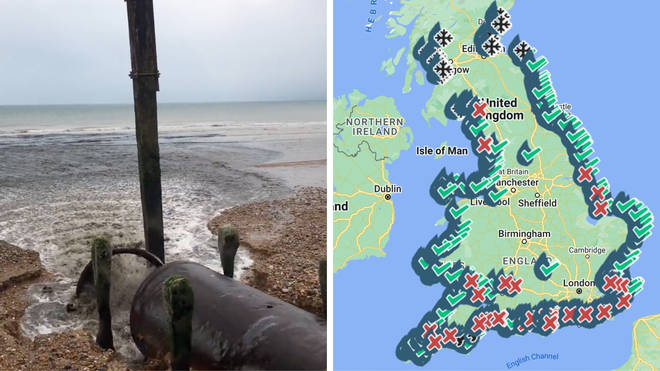
This flush-ed throne of kings, this septic isle,
This earth of dysentery, this seat so foul,
This other Eton; all others cast as nought.
This fortress built by Nature for herself
Doth breed infection, faecal stench and more.
Unhappy breed of men, this little world,
This noxious stone, set in a septic sea
Some wish would serve the office of a wall
Or as a moat defensive to a house,
Against asylum from less happier lands.
This fetid plot, this earth, this realm, this England
This curse, this seeping wound of loyal serfs
Who hold the future leader in their hands
Renowned as bigots, far from the pains of life.
These few, these scrappy few, hold hustings vile
Where two inadequates hold forth,
Lead all to ransom, quake and so to fear
What future holds in days and times to come.
Wild speculators suck up all the gold
Whilst poor and not so poor do fret and ask
To eat, to heat? What will become of us?
Cut taxes! Screams the heir most like
To win, as if this would cure ev’ry ill.
We’ll find, alas too late! This bitter pill
Will make things worse, against our will.
Shall workers all rise up and down their tools
Or new and vicious law ban this as well?
While those from other lands avert their gaze
And realising gone our glory days.
That England, that still yearns to conquer others,
Hath made a foolish conquest of itself.
Ah, would these vandals vanish from my life,
And happier times and wiser counsel rise!
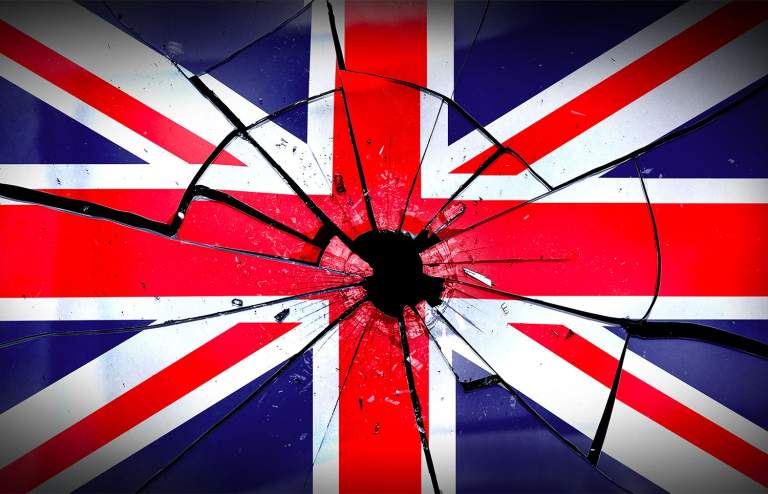
There’s just too much news around right now.
For many weeks, every day we seem to be presented with two or three new stories, each of which would be headline news on a “normal” news day. Examples include:
Over the years since I started, this blog has, at times, resembled a running commentary on the current news headlines. On that basis, the events since December 2019 have just about stunned me into silence. One awful thing after another…
Looking back, my original intention had been something slightly more detached from the day-to-day stuff: something a bit reflective, and also more varied in style and subject matter. I have considered a variety of topics affecting the country: the benefits, or otherwise of a written constitution, the UK splitting into constituent parts, surely now with odds-on departures by Scotland and Northern Ireland, the UK or its parts becoming republics, our voting system, our economic prospects and chances of re-joining the EU. Not much to laugh (or even smile) about in that lot.
But there’s something altogether more urgent: how to extricate ourselves from the continuing disaster of the present “government”? The Johnson Cabal is the most clear and present danger to liberal democracy in the UK.
First, the question of Johnson himself. Will he stay? Will he go – willingly or kicked out? If so, how soon? What would be the final straw? How much further damage can he (and they) do in the meantime? None of this is certain right now. But this much is clear: the UK’s international reputation is at rock bottom, at least since 1956 and Suez: I was much too young to understand what was happening at that time. The bad faith exhibited by the UK government in trade negotiations with the EU alone has shattered any image of this country as a mature, stable democracy. I don’t expect other countries’ leaders to restore their trust in us during my lifetime. It’s a depressing thought.
The Tories, by which I mean principally the Conservative parliamentarians, have changed out of all recognition during my adulthood. Gone are the days of “Butskellism” of the 1950s and early 1960s. There have been two periods of ratcheting the Party in the direction of free market fundamentalism and authoritarianism. The first, in the 1980s, led by Margaret Thatcher and the second since 2019 by Boris Johnson. The party is increasingly divided into cliques, frequently including “Research Group” in their names, each jockeying for the PM’s attention and trying to drag the Party to even further extreme policy positions. For Thatcher, the enemies within were the “wets”. Johnson forced the last remaining sensible Tory MPs out and the 2019 intake demonstrated a further lurch to extreme and unreasoned positions.
In short, the Tories today are more like the erstwhile lunatic fringe parties of the past 30 -40 years: the Referendum Party and UKIP, to name the most obvious. Any resemblance to the party of Harold Macmillan and Edward Heath has vanished.
So what if Johnson is forced out soon, in the coming weeks? Well, we’d then be presented with another round of the tawdry spectacle of a Conservative leadership contest. The final vote (assuming there’s a contest) would be taken by the 150,000 Conservative Party members, arguably the group most regressive and unrepresentative of public opinion imaginable.
And who are the contenders to replace Johnson? Let’s start with the present Cabinet members – or better still, let’s not. In my estimation, every single member is either a deranged zealot or an idiot, or a combination of the two. They were chosen because (a) they were true believers of the cult of Br*xit or (b) so stupid that they would not make Johnson look bad in comparison. Many perform both roles.
There are people for whom it is inconceivable that they would have reached high office under any other PM in the post-war period: perhaps the two most obvious are 18th-Century Mogg and “Mad Nad” Dorries.
Taking all things into consideration, I can say that the UK has reached the lowest point – in terms of esteem – since at least 1955, or more likely, 1940. We need, as a people, to engage in a rigorous analysis of how we have sunk so low. An honest appraisal of our former role as an empire would be a good start. But we can already say with confidence that the whole ramshackle part-feudal, part-democratic “constitutional” order is a broken model, totally unfit for any country in this modern world. (On that point, the days are long gone since Britain/England could bend the world order to our advantage; today we must find the humility to accept that we adapt to the modern world order, not the other way around.)
The model for how to proceed has to be one which will work given our weird situation as four nations, with an overweening England, held together – just – as a single “Kingdom”. One good place to look would be the Irish Republic and how that country engaged in an open debate about abortion reform. A UK government must set up a Constitutional Convention to review all the big issues that have combined to get us into this mess. Topics include:
It’s quite clear that the current administration would never agree to this course of action. Turkeys don’t vote for Christmas; Tories want to keep matters unfair, as they clearly are now. But that doesn’t stop organisations and people with the relevant skills or experience to aim to start a major communication exercise to come up with a prioritised plan for execution when times are more conducive.
… we need to vote the Tories out of power.
I would hope that a sufficient number of influential people will be sufficiently horrified by the actions of the Johnson cabal to realise that extreme times call for extreme measures. It should be possible, in England and Wales at least, for centre-left and progressive parties to come to some agreement to maximise the chances that the Tories lose the next election. We need some sort of formal pact or informal understanding to clear the way for the candidate most likely to beat the Tories to be given a “clear run” at the next election. There will be purists who will object, but these are dangerous times for democracy. In addition, there needs to be some extra-parliamentary activity to hinder and frustrate the more egregious plans that Johnson and his cabal are threatening us with.
If we cannot organise to do this, the only alternatives seem to me to be worse: revolution or a rapid decline into some authoritarian/fascist pariah state under a Party which is Conservative in name only and in reality something more sinister.
Note: this post has been put together in spare moments over the past four or five days. By coincidence, both lead articles in yesterday’s Observer seem to cover similar points. The articles can be found here and here.
Here’s an old song with new lyrics for our times…

Last Christmas, I got
pissed as a fart
But the very next day, your gran passed away
This year, to save me from tears
I’ll ignore you for someone special
Last Christmas, I got
pissed as a fart
But the very next day, your gran passed away (your gran passed away)
This year, to save me from tears
I’ll ignore you for Boris de Pfeffel (that’s me!)
Once bitten and thought I would die
I don’t social distance, did you think I would try?
Tell me, baby, do I make you ill?
Well, it’s been a year, too late for old bill
Donations, I lapped
up and spent it
So often I’ve said things, but I’ve never meant it
Now I know what fools you’ve all been
But if you trust me now, I know I’d fool you again
Last Christmas, I got pissed as a fart
But the very next day, your gran passed away
Oh dear, she’s just a statistic
I don’t care, I’m so narcissistic!
Last Christmas, I got
pissed as a fart
But the very next day, your gran passed away
This year, to save me from tears
I’ll ignore you for Boris de Pfeffel (that’s me!)
Oh
Oh, oh, baby
A crowded room, friends with red eyes
I hide from the truth and I keep telling lies
My God, I’m not one to rely on
Me? I guess I get bolder with each try on
A disgrace like no other, with contempt in my heart
You could hide under cover but I’ll tear you apart
Ooh, ooh, now I’ve got some real power
I’ll never lose it again
Last Christmas, I got
pissed as a fart
But the very next day, your gran passed away (your gran passed away)
This year, to save me from tears
I remember I’m someone special (special)
Last Christmas was only the start
‘Cos time and again, and you won’t know when
This year, too bad you have fears
I know I’m the only one special (special!)
A man like no other with “liar” in my heart
You could run under cover, but I’ll tear you apart
Just wait ‘til next year, I’ll still be right here
I’m planning on something special (special!)
You were warned…